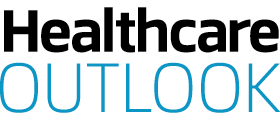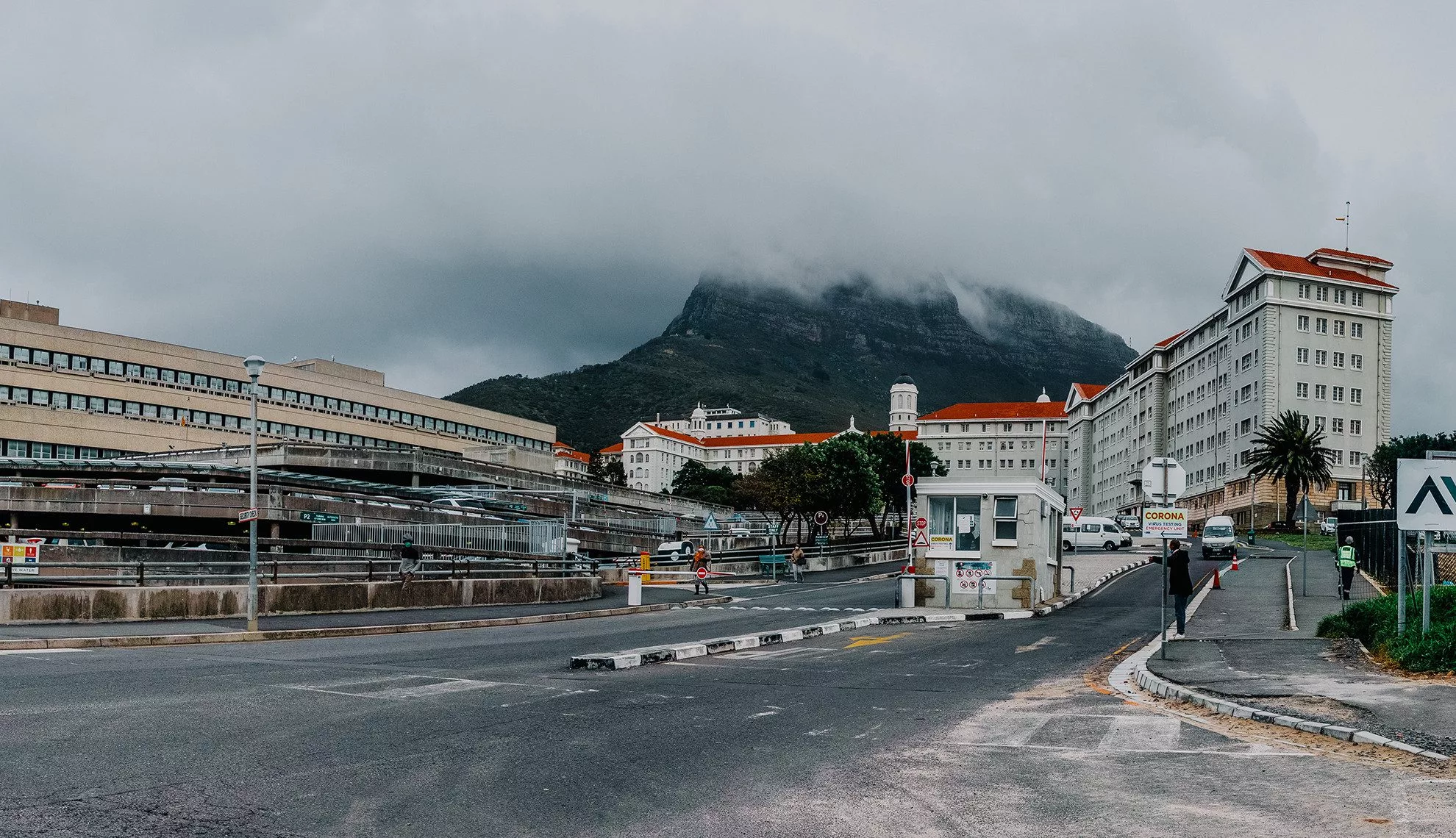Healthcare in South Africa is challenging, but Groote Schuur Hospital continually rises to the occasion with its rich legacy, passionate CEO, and expert staff.
82 YEARS OF PATIENT CARE
Groote Schuur Hospital is an imposing stone building in the shadow of Devil’s Peak on the Western Cape, part of a ‘miniature city’ of different accommodation and training centres.
Above its central gable is a statue of Hygeia, the Greek goddess of health – she has been welcoming patients since the hospital opened in 1938. In its current incarnation it is a 975-bed public hospital providing specialist and sub-specialist care, with strengths in transplant services and cancer care. It also offers services in all medical and surgical sub-disciplines, psychiatric, neurosciences, obstetrics, gynaecology, neo-natal care and much more. The Department of Anaesthesia, Peri-operative Medicine and Critical Care support all these specialised activities. An estimated 10,000 people pass through its doors on a daily basis.
If the walls of the building could talk, they would have thousands of stories to tell. Stories of ground-breaking medical procedures; of the upheavals of World War II and of apartheid; of world-famous doctors and dedicated nurses.
“The legacy of Groote Schuur Hospital is a huge inspiration to all who work at the institution and all who wish that they could work there,” says Dr Bhavna Patel, CEO of Groote Schuur Hospital (or GSH).
Her own journey, from medical student to CEO, is in itself an inspiration. Patel has had a lifelong interest in becoming a doctor.
“After qualifying at the University of Cape Town, I completed my internship at Groote Schuur Hospital. You must understand that this was around the time when apartheid was still very much prevalent in South Africa; while the class was only comprised of 10 percent non-whites, after completing six years of study, very few of the non-whites were employed in the public hospitals. I therefore started a private practice, which I managed for about eight years,” she explains.
During this period, Patel studied a fellowship with a specialisation in Public Health and was placed on rotation at GSH. And it was here she stayed, rising through the ranks until she transitioned from the position of senior manager to CEO.
“I am humbled and proud to lead such a wonderful institution,” she says.
AN INSPIRING LEGACY
And it’s easy to see why.
Groote Schuur Hospital opened to great fanfare in 1938; a magnificent cross-shaped structure designed to promote recovery with its well-ventilated, light-filled wards, and balconies and verandas for patients to enjoy the fresh air.
But despite a promising start, the advent of the Second World War quickly strained funds and services. In 1944 the Plastic Surgery Unit was established, dealing with facial disfigurements and skin grafting for burns.
Throughout the 50s and 60s, GSH’s doctors and surgeons conducted world-renowned research and surgical procedures. Dr James Louw introduced the pap smear to South Africa in 1955, while in 1957 Allan Cormack developed the world’s first CAT scanner (a contribution to medicine that would later see him win the Nobel Prize).
Arguably, 1967 represents the zenith of GSH’s contribution to medicine, as this was the year that Dr Christiaan Barnard performed the world’s first human to human heart transplant. This event placed the hospital in the spotlight.
“On Saturday, I was a surgeon in South Africa, very little known. On Monday, I was world renowned,” Barnard said at the time.
From developing the world’s first blood-warming machine in 1967, to delivering a ‘miracle baby’ that gestated on the mother’s liver in 2003, GSH has broken new medical ground on many occasions.
“For me, building on that innovative spirit, cultivating and nurturing an environment of supporting new thinking and being open to ideas makes the hospital an exciting place to work,” Patel explains. “Quality is never compromised, but innovative ideas, defined as anything that is new or different and that will improve the care that we offer our patients, are always supported. Hence our vision statement of ‘Leading Innovative Healthcare’.”
INNOVATION THROUGH TRAINING
Since first taking office, Patel has prioritised this vision statement.
“We strive to deliver quality healthcare to the patients through improved leadership, better team functioning and creating a culture of ongoing continuous improvements,” the CEO explains.
Realising that few of the hospital’s senior executives had any formal training or qualifications in management and leadership, Patel conceptualised and implemented a Leadership Development Programme to facilitate learning, based around the vision statement.
Many of the learning activities took place internally, facilitated by Patel. One aspect of the programme included a call for innovative ideas during a one-week scoping exercise, supported by the Bertha Centre for Social Innovation and Entrepreneurship at Cape Town University. The best ideas were selected and ultimately developed, including a Resource Hub for volunteers, ways of streamlining referrals and communicating and tracking via an eBoard.
In 2015 an Innovation Hub was opened, a physical environment where staff could think outside the box, without the usual distractions of work.
Patel desires to maintain this cycle of continuous improvement, enabling GSH to become a resilient learning organisation, constantly striving for excellence and adapting to change. In her opinion, excellence is achieved through education and staff learning.
The hospital is affiliated with the University of Cape Town, one of Africa’s top-ranked institutions. It provides a practical training platform for both undergraduates and postgraduates.
“On top of that we also serve as the base where all the university research activities happen, leading to much acclaim for both the university and the hospital,” Patel explains.
But for the CEO, learning should be for everyone. The hospital offers a raft of training programmes including Basic Education for early school leavers, computer literacy, and degrees and diplomas allowing all staff to progress in their fields of work.
“Sustaining a level of expertise requires the hospital to keep up with advances in technology and building the capacity of the staff and managers, so that the hospital maintains its world-renowned status as a leader of innovative healthcare,” Patel comments.
BUILDING REFURBISHMENT
As well as continual training, it is also important for the hospital to ensure that its procedures and facilities are as up to date as possible.
Active interventions over the past decade have seen a dramatic reduction in new patient waiting times, as well as lowered consumption of coal and water (which dropped 42 percent and 51 percent respectively between 2010 and 2016).
However, fully refurbishing and upgrading facilities can be difficult for state-funded hospitals such as GSH. For this, they are often reliant on the generosity of private donors. It was through such generosity that the hospital was recently able to upgrade its neo-natal unit. As its maternity centre serves as a referral unit for all complicated obstetric cases, it looks after many premature babies requiring intensive care, but, according Patel, the unit was too cramped. Extra space was found, but there were not enough funds for the upgrade.
More from Healthcare Outlook
“Fundraising efforts collected small amounts, but insufficient for the needs of the restructuring. After seven years, our luck turned and a donor from the United Kingdom heard of our pledge and agreed to donate the full amount needed, plus additional amounts for totally new equipment. This donor had a link to the hospital since his grandfather was the very first specialist to perform an anaesthetic at GSH when it opened in 1938,” the CEO explains.
The newly refurbished neo-natal unit now has adequate space for the babies, staff resting areas and teaching facilities. According to the CEO, the quality of care being offered has improved, alongside staff morale.
OVERCOMING CHALLENGES
Despite its rich legacy and excellent reputation, the eight decades in which the hospital has been operating have seen many challenges.
Specifically, the 1948 policy of apartheid had implications for medical patients, students, and staff, with segregated wards, salary disparities and unequal funding. ‘Non-white’ services experienced much greater pressure, while ‘non-white’ staff were denied the career and training opportunities of their white peers. Past students Professor Abdul Wahab Barday and Dr Bhadra Uttam Chavda recall that they were often not allowed to witness post-mortems when a white patient was involved. Even attending medical school was difficult.
“We as ‘Darkie Students’ had to apply to the to the Minister of Education, and also had to obviously apply to the ‘White’ University, UCT,” they explain.
“Despite having done our clinical years mostly at GSH, we as black students were not allowed to do the internship at GSH because of the apartheid policy. We had to apply to Somerset or Livingstone Hospital.”
This is not to say that members of staff at the hospital condoned these policies. Chief Medical Superintendent Dr Joce Kane-Berman was temporarily dismissed from her post in 1988 for comments concerning her support of Nelson Mandela and the future of an undivided South Africa.
Patel believes it is important to learn from the past to affect transformation in the future.
“With this in mind, transformation at Groote Schuur must promote equality for all the citizens that enter our premises. Equality in the treatment that we offer; equality in the criteria that we apply; equality in the way that we teach and train our students and, most of all, equality in the mannerism and behaviour that we practise when doing so,” she explains.
But outside of the hospital, South Africa is still “hugely inequitable”, according to the CEO, making delivering healthcare a challenge.
“The public health care services need to support more than two thirds of a growing population of unemployed, uninsured citizens and immigrants from elsewhere in Africa seeking care. This trend is compounded by an ageing population, a rising burden of infectious and chronic diseases and a global shortage of an adequately skilled workforce,” she explains.
Patel cites a report by Statistics South Africa which states that half of adults over 18 live below the poverty line, unemployment is at 29 percent and 31 percent of households rely solely on social grants. What this means is that over 80 percent of the South African population rely solely on the public health services – hospitals such as GSH, who must balance a demand for care with diminishing resources.
However, the CEO remains determinedly optimistic, beginning by asserting that the standard of health service delivery across the Western Cape is relatively stable.
“There will always be challenges, but how one responds to this is determined by the environment we work within. With the government considering the implementation of a National Health Insurance model of care, these are interesting times to be in a space of leadership in healthcare, since what we plan and do now can improve the future of health in the country and better care for our patients,” she says.
THE COVID-19 CHALLENGE
The newest chapter in the story of Groote Schuur Hospital is that of COVID-19, the global pandemic that has claimed 835,843 lives at the time of writing, and disrupted millions of others.
Following the reports from China, Europe, and the USA, Patel and her team anticipated that the virus would eventually arrive in South Africa. They began to plan for this in February and had de-escalated the hospital’s outpatient department and theatre activities by mid-March.
On March 23rd, South Africa went into lockdown. On April 1st, the first coronavirus patient arrived at GSH. And after that it was all hands on deck.
As cases increased, the pandemic took its toll on the staff.
“They had to deal with their own fear; with the fear of infecting their family members, some of whom were susceptible; with many patient deaths – some prolonged, some too quick; with calling family members and only speaking to them on the phone as they could not visit the patient while in hospital; with working in teams; with being totally outside of their comfort zones and needing to adapt to this fairly quickly,” Patel explains.
In response to this, the CEO ensured that staff received counselling and support from an onsite wellness team, and that relief teams were in place when COVID-19 cases rose among the team. She also ensured that she and her fellow management were “leading from the front” – being visible and supportive, despite the anxieties they also faced.
Another difficulty was ensuring smooth supply chain management throughout the pandemic; deliveries of PPE and consumables needed to be planned well in advance.
According to Patel, this proved challenging as the hospital’s regular suppliers were not always able to deliver.
“Our relationships held us in good stead. Simple historical factors, such as ensuring that we always paid the supplier within the required timeframe, speaking personally to certain company representatives and bulk-ordering together with other hospitals assisted us to meet the needs of our patients and staff,” the CEO explains.
Despite difficulties with supply – and the need to be wary of companies who made promises they couldn’t deliver – GSH managed to stay within the year’s budget.
As well as managing the situation in the hospital, GSH’s expert staff are collaborating with others around the world to help fight the virus. It is a site of the Solidarity trial, an international clinical trial launched by the World Health Organization and its partners, and many other research collaborations. GSH has also introduced virtual weekly lectures about COVID-19, which are attended by clinicians across Africa.
The past couple of months have been difficult for GSH. But thanks to its committed staff, visible leadership, resident experts and good supplier relationships, it has never become overwhelmed.
“This has been a challenge, but through a team spirit and the wonderful commitment and dedication of our staff, we hope we have overcome the worst part of the effect of this virus,” Patel says.
LOOKING FORWARD TO THE FUTURE
The next chapter in the story of Groote Schuur hospital is all about learning and transformation. Patel wants to look ahead, not only continuing to treat coronavirus patients but being able to cater to this new reality through adaptation of services.
“It most certainly cannot be business as usual and as I have continually told the staff, if we have not learnt any lessons from this COVID experience, then all the pain and lives lost will have been in vain,” the CEO says.
“We have lost too much not to plan for this new reality. How do we offer our services differently? How do we plan for a ‘whole of society’ approach to health in our country? How do we follow a systems approach to the health of our patients? How do we integrate information technology and information management to learn and adapt? How do we build resilience within the staff and the organisation? How do we sustain excellence in healthcare? How do we keep the Groote Schuur Hospital energy alive?”
There are, then, a lot of questions to be answered and challenges to be tackled. According to Patel, these will be addressed slowly, and in a phased manner. In doing so, she hopes to continue to build GSH into a prosperous hospital – one with the resilience and capacity to deal with any challenge that is thrown at it.
With Patel’s passion, the dedication and expertise of her staff, and the rich legacy of Groote Schuur Hospital, we have every reason to believe she will succeed.



























